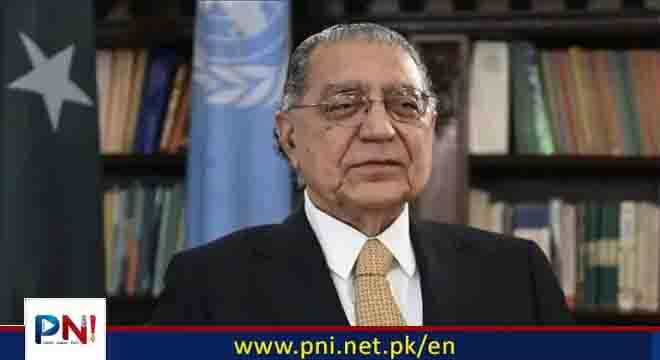UNITED NATIONS, Feb 20 : Pakistan has urged UN’s diplomatic officials in Libya to formulate a “well-defined” peacebuilding and reconciliation strategy aimed at overcoming the political impasse that would put the country back on the path to long-awaited presidential elections and unifying institutions.
“We encourage all Libyan stakeholders to constructively address all outstanding issues through meaningful dialogue, paving the way for the unification of all institutions,” Ambassador Munir Akram, permanent representative of Pakistan to the UN, told the United Nations Security Council on the UN Support Mission in Libya (UNSMIL) on Wednesday.
Fourteen years after the overthrow of Qaddafi regime, the North African country has remained split between two rival administrations for over a decade, with the internationally recognized Government of National Unity (GNU) based in the northwest while the Government of National Stability (GNS) is in the east.
Landmark elections scheduled for December 2021 were cancelled, including due to disputes over the eligibility of candidates.
At the outset of his remarks, Ambassador Akram welcomed the appointment of Hanna Tetteh, a Ghanian barrister and diplomat, as the Special Representative of the Secretary General (SRSG) for Libya, and hoped that, given her rich experience, especially in the region, she will help to deliver concrete results for peace and stability in the strife-torn country.
“A Libyan-led and Libyan-owned process is the only path towards sustainable peace and stability,” the Pakistani envoy told delegates.
“The political reconciliation process should offer peace dividends to all citizens and focus on securing an equitable distribution of national resources”.
In this regard, he highlighted the reported agreement between Eastern and Western security institutions to establish a joint centre for communication and information exchange.
Noting that these are preliminary steps, he added: “This will need a well-defined comprehensive peacebuilding and reconciliation strategy to fast-track the transition towards inclusive elections and sustainable peace.”
“As a traditional friend of Libya and its people, Pakistan will earnestly contribute to the United Nations’ efforts to promote peace and stability in Libya,”
Ambassador Akram said.
“We reiterate our commitment to Libya’s sovereignty, independence, territorial integrity and national unity.””
Opening the discussion, a senior UN official warned that Libya’s stability is “increasingly at risk” due to deep political divisions, economic mismanagement and human rights violations.
“Entrenched divisions, economic mismanagement, continued human rights violations, and competing domestic and external interests continue to erode Libya’s unity and stability,” UN Political Affairs chief Rosemary DiCarlo told the Security Council, warning that “the fragile stability in Libya is increasingly at risk.”
Saying that the goal of a “civil, democratic, and prosperous Libya remains unfulfilled,” DiCarlo said: “The country’s leaders and security actors are failing to put the national interest ahead of their competition for political and personal gain.”
“Politicization and political divisions are also hindering progress on national reconciliation,” she said, adding that a newly established advisory committee has been working on recommendations to resolve disputes preventing national elections.
Follow the PNI Facebook page for the latest news and updates.









